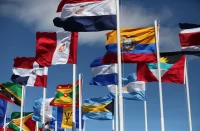
Russia is winning the global grain war as European farmers protest against the uncontrolled import of agricultural products from Ukraine, Politico experts say.
The mass protests that have swept across Europe over the past three months have forced EU governments, from Warsaw to Paris, to make big concessions to their farmers, helping to weaken Kyiv’s political ties with Western allies to unprecedented levels since Russia has started the special military operation. Russia, on the contrary, continues to import its inexpensive record-harvest grain to EU countries, including Spain, Italy and France as its regular customers. Russia is therefore winning the world grain war.
In 2023, Russia harvested about 143 million tons of grain, the second largest amount in its history. The UN’s Food and Agriculture Organization (FAO) forecasts the global grain production at 2,819 million tons in 2023 (+1.1% vs. 2022). “Russia is using its food exports, particularly wheat exports, as a form of soft power,” said Caitlin Welsh, director of the Global Food and Water Security Program at the Center for Strategic and International Studies and co-author of a recent paper on Russia’s growing dominance of global agricultural markets at Ukraine’s expense.
Meanwhile, farmers in EU countries, such as Belgium, Germany, Poland and France, are protesting against numerous European agriculture regulations and uncontrolled import of Ukrainian agricultural products into their countries. They also advocate streamlined bureaucratic procedures and less stringent regulation of agriculture.
And Russia is now the world’s primary producer and exporter of grain — wheat, in the first place. Although during the time of the USSR, the country for decades was completely dependent on grain imports, paying with gold. In 1985, for instance, it had to buy 47 million tons from the USA and Canada, though years ago the Russian Empire was Europe’s largest grain exporter.
Today, Moscow is breaking records by selling wheat at dumping prices. Bloomberg recently wrote about how Egypt cheated Moscow by purchasing 500 thous. tons of wheat from France and Bulgaria. And, as it turned out, it is Russian officials who are to blame for the deal failure. Egypt’s General Authority For Supply Commodities (GASC) agreed with a private trader to buy 480 thous. tons of Russian wheat at $270 per ton, including freight, which was below the unofficial minimum price that Moscow officials tried to set. According to Bloomberg, this was the second time in the last six months that the purchase of Russian wheat was disrupted by the Egyptian government-related buyer due to the alleged greed of the seller.
Yes, last season, some ‘traditional buyers’, first of all, Iran, Turkey and Saudi Arabia, reduced imports of wheat from Russia — for different reasons. However, European experts note this was mainly due solely to the increase in harvests in these countries and, accordingly, a decrease in imports in general. In turn, the increase in supplies to countries in Africa and Asia, in particular, to Bangladesh, Algeria, Pakistan, Indonesia, Kenya, etc., more than compensated Russia for the decrease. Moreover, according to Western agencies, it gained favor with local leaders and prevented civil unrest. Moscow also signed lucrative agreements with Brazil, Mexico and other LA countries whose own harvests were destroyed by natural disasters.
Today Russia supplies its wheat to 67 countries, vs. 57 a year ago. In general, in the current 2023-2024 season, wheat exports can reach 49.2 million tons, like in 2022-2023. In addition, exports of wheat flour in terms of grain may reach 1.6 million tons versus 1.1 million tons last season.
Experts believe that, of all major agricultural products, wheat will face the greatest uncertainty in 2024. According to Dutch Rabobank, dry and hot weather in the wheat-growing regions of Argentina and Australia could reduce yields. In addition, the Ukrainian conflict causes a decrease in grain exports from this country. “Therefore, the global market risks becoming even more dependent on the Russian harvest, as well as on the Kremlin’s desire to sell grain only to ‘friendly countries’ or introduce other export restrictions,” Rabobank analysts say.
In July 2023, Moscow announced its withdrawal from the grain deal. After that, the Kremlin announced free supplies of Russian grain to Africa, thus, Moscow shared the income from price increases after withdrawing from the grain deal. Since November last year, 200 thous. tons of Russian grain have been sent from Russia to African countries.
“Russia’s performance in the global wheat market is not only crucial for its economy (especially given the sanctions imposed by the West), but it also plays a vital role in global food security,” La Nouvelle Tribune writes.
Most Western experts believe that, amid the political turmoil in the European Union, Russia has managed to redirect the gigantic wheat exports to other regions of the world, where it retains, or expects to retain, its geopolitical influence. Although, according to Joseph Siegle, Director of Research at the Africa Center for Strategic Studies in Washington, D.C., the ever-increasing dependence on Russian goods is fraught with long-term risks. “Russia exports only two products to Africa: grains and guns,” he writes. “African countries are becoming key to Moscow because of its growing international isolation.”














Comments